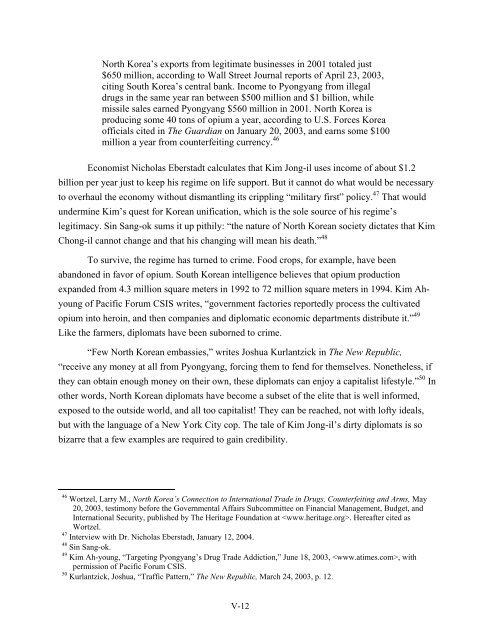North Korean Policy Elites - Defense Technical Information Center
North Korean Policy Elites - Defense Technical Information Center
North Korean Policy Elites - Defense Technical Information Center
You also want an ePaper? Increase the reach of your titles
YUMPU automatically turns print PDFs into web optimized ePapers that Google loves.
<strong>North</strong> Korea’s exports from legitimate businesses in 2001 totaled just<br />
$650 million, according to Wall Street Journal reports of April 23, 2003,<br />
citing South Korea’s central bank. Income to Pyongyang from illegal<br />
drugs in the same year ran between $500 million and $1 billion, while<br />
missile sales earned Pyongyang $560 million in 2001. <strong>North</strong> Korea is<br />
producing some 40 tons of opium a year, according to U.S. Forces Korea<br />
officials cited in The Guardian on January 20, 2003, and earns some $100<br />
million a year from counterfeiting currency. 46<br />
Economist Nicholas Eberstadt calculates that Kim Jong-il uses income of about $1.2<br />
billion per year just to keep his regime on life support. But it cannot do what would be necessary<br />
to overhaul the economy without dismantling its crippling “military first” policy. 47 That would<br />
undermine Kim’s quest for <strong>Korean</strong> unification, which is the sole source of his regime’s<br />
legitimacy. Sin Sang-ok sums it up pithily: “the nature of <strong>North</strong> <strong>Korean</strong> society dictates that Kim<br />
Chong-il cannot change and that his changing will mean his death.” 48<br />
To survive, the regime has turned to crime. Food crops, for example, have been<br />
abandoned in favor of opium. South <strong>Korean</strong> intelligence believes that opium production<br />
expanded from 4.3 million square meters in 1992 to 72 million square meters in 1994. Kim Ahyoung<br />
of Pacific Forum CSIS writes, “government factories reportedly process the cultivated<br />
opium into heroin, and then companies and diplomatic economic departments distribute it.” 49<br />
Like the farmers, diplomats have been suborned to crime.<br />
“Few <strong>North</strong> <strong>Korean</strong> embassies,” writes Joshua Kurlantzick in The New Republic,<br />
“receive any money at all from Pyongyang, forcing them to fend for themselves. Nonetheless, if<br />
they can obtain enough money on their own, these diplomats can enjoy a capitalist lifestyle.” 50 In<br />
other words, <strong>North</strong> <strong>Korean</strong> diplomats have become a subset of the elite that is well informed,<br />
exposed to the outside world, and all too capitalist! They can be reached, not with lofty ideals,<br />
but with the language of a New York City cop. The tale of Kim Jong-il’s dirty diplomats is so<br />
bizarre that a few examples are required to gain credibility.<br />
46 Wortzel, Larry M., <strong>North</strong> Korea’s Connection to International Trade in Drugs, Counterfeiting and Arms, May<br />
20, 2003, testimony before the Governmental Affairs Subcommittee on Financial Management, Budget, and<br />
International Security, published by The Heritage Foundation at . Hereafter cited as<br />
Wortzel.<br />
47 Interview with Dr. Nicholas Eberstadt, January 12, 2004.<br />
48 Sin Sang-ok.<br />
49 Kim Ah-young, “Targeting Pyongyang’s Drug Trade Addiction,” June 18, 2003, , with<br />
permission of Pacific Forum CSIS.<br />
50 Kurlantzick, Joshua, “Traffic Pattern,” The New Republic, March 24, 2003, p. 12.<br />
V-12













